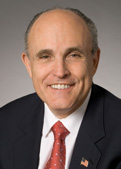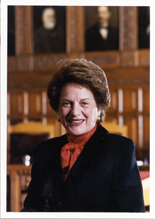 Rudy Giuliani is apparently in violation of New York’s new ethics rules that went into effect one week ago. The former U.S. Attorney for the Southern District of New York, mayor, and now presidential candidate, has failed to label his firm’s web site as “attorney advertising” as required by the new Disciplinary Rules. Law firms large and small, famous and not, with New York offices continue to show widespread ignorance or disregard for the new rules on attorney advertising. While some may have constitutional concerns, only one is known to have brought a legal challenge on that basis.
Rudy Giuliani is apparently in violation of New York’s new ethics rules that went into effect one week ago. The former U.S. Attorney for the Southern District of New York, mayor, and now presidential candidate, has failed to label his firm’s web site as “attorney advertising” as required by the new Disciplinary Rules. Law firms large and small, famous and not, with New York offices continue to show widespread ignorance or disregard for the new rules on attorney advertising. While some may have constitutional concerns, only one is known to have brought a legal challenge on that basis.
Despite front page treatment of the news in the New York Law Journal and wide discussion in blogs since the proposed rules were announced last June, a great many firms have committed an ethical violation. (For a presidential candidate, among others, that’s probably not good.)
I wrote last week of the failure by 11 of the largest 15 firms in the nation (with New York offices) to comply with the easiest part of the rules, putting the words “attorney advertising” on the home page of their web sites. This was picked up by Law.com Blog and WSJ Law Blog giving the news a bit more distribution. Many have since complied. A few that are currently in violation of the ethics rules:
- Bracewell & Giuliani (Rudy Giuliani firm, with New York office)
- Baker & McKenzie (largest firm in the U.S., with over 3,000 attorneys)
- Akin Gump (creator and sponsor of SCOTUS Blog, leading blog on the U.S. Supreme Court)
- Morgan Lewis (New York based firm with over 1,000 attorneys)
- McDermott, Will & Emery (leading Chicago firm with NY office)
- Foley & Lardner (leading Milwaukee firm with NY office)
- O’Melveney & Myers (Los Angeles firm with NY office)
- Bryan Cave (largest firm in St. Louis, NY office is home to former Mayor Ed Koch)
- Raoul Felder (high profile matrimonial attorney and TV talking head)
Since a Google search of New York attorneys returns 16 million hits, I didn’t spend too much time on this. It appears clear though from a brief spin through sites large and small that compliance failures are common.
There are a few possible reasons:
- Ignorance – Some lawyers don’t keep abreast of changes in the law (or in this case, disciplinary rules);
- Assumption that someone else has taken care of it;
- Vagueness of the rules: As I wrote last week, the rules apply if the “primary purpose” of the web site is the retention of clients. That definition is both vague and over broad and, I think, is likely to fall to constitutional challenge.
Personally, I think the primary reason is the first: Ignorance. This is not based on scientific survey, of course, but on a version of Occam’s Razor: All things being equal, the simplest answer tends to be the right one.
Other links to the subject:
New Attorney Advertising Rules (Is This Blog an Advertisement?) (this site)
New York Advertising Rules (Sui Generis)
Some More Discussion About New York’s Attorney Advertising Rules (New York Civil Law)
NYSBA Rules Fiasco (The Common Scold)
[Update 2/15/07: Rudy Giuliani Finally Complies With New York Ethics Rule)

